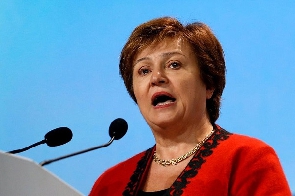The International Monetary Fund has said it expects Ghana’s economy to pick up steam in 2024.
During the Q&A session at the just-ended World Economic Forum in Davos, Switzerland, Mr Daniel Leigh, Division Chief at the Research Department, told journalists, in response to a question that Ghana’s tottering economy will grow slowly this year but then pick up momentum the following year.
“On Ghana, we do expect growth to slow this year”, Mr Leigh said, explaining: “This is partly because of the global headwinds…”
“So, it’s a difficult time for the global economy that affects Ghana”, he noted.
But also, he added, “there are some domestic headwinds. In particular, inflation has increased significantly”.
“And, so, the central bank is tightening monetary policy, but that is cooling the economy domestically”, Mr Leigh noted, indicating: “Plus, the fiscal policies are tightening to address the elevated debt. This is the cooling in 2023”.
“But in 2024, we see a rebound, in particular, in the extractive activities. And that is going to support Ghana in 2024”, he pointed out.
“I would add that right now – so just very recently – the IMF team went to Ghana, reached agreement with the Ghanaian authorities on an economic reform programme that will be supported under a $3-billion extended credit facility”.
“And the goal of that programme is to reestablish macroeconomic stability, debt sustainability, and create the foundations for higher and inclusive growth over the medium-term”.
On the expected situation in the sub-region, Mr Pierre-Olivier Gourinchas, Chief Economist and Director, Research Department, said: “On Sub-Saharan Africa, what I can say is that we have a difficult year for the region that is very much affected by the external forces that are shaping the global outlook, whether it’s the Russian war in Ukraine and energy crisis or the fight against inflation and the tightening of global financial conditions that comes with that”.
“But growth is projected to be around 3.8 per cent in Sub-Saharan Africa. And this is quite a bit below the typical growth rates that the region experienced before the pandemic”, Mr Gourinchas said.
“And in addition, in the region, there is an issue of food insecurity. Even though food prices have come back – the food price index has come back to pre-war level, so levels we had about a year ago or a little bit more than that – they’re still elevated compared to pre-pandemic times. And there are in many countries a large portion of the population may be subject to food insecurity”.
Business News of Wednesday, 1 February 2023
Source: classfmonline.com













